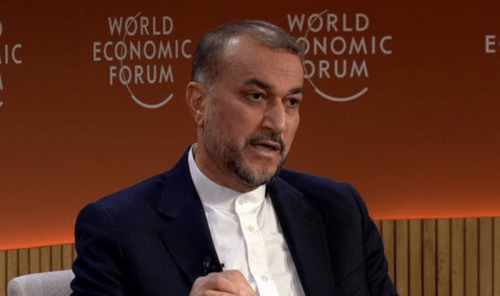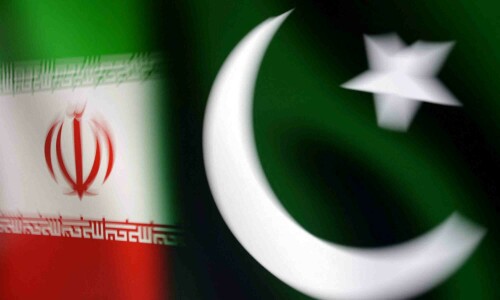Caretaker Prime Minister Anwaarul Haq Kakar on Friday said that it was in the interest of both Iran and Pakistan to take steps to restore their relationship to the levels before Tehran violated the country’s airspace.
On Tuesday, Iran had launched attacks in Pakistan targeting what it described as bases for the militant group Jaish al-Adl in the border town of Panjgur in Balochistan, Iranian state media reported, prompting strong condemnation from Islamabad and downgrading of diplomatic ties.
The Iranian strikes were part of a series of attacks carried out by Iran in recent days in Syria and Iraq as a response to recent terrorist attacks on its territory. They have heightened concerns about regional stability, particularly amid ongoing conflicts in the Middle East.
The next day, Pakistan struck “hideouts used by terrorist organisations namely Balochistan Liberation Army (BLA) and Balochistan Liberation Front (BLF)” in Iran’s Sistan-Baluchestan province, in an intelligence-based operation codenamed ‘Marg Bar Sarmachar’.
Iran’s IRNA news agency had reported that nine people were killed in the attack targeting a village in the city of Saravan, with Iranian Interior Minister Ahmad Vahidi saying all the dead “were foreign nationals”.
Following Pakistan’s tit-for-tat response to Iran’s missile attack, PM Kakar, who was in Switzerland for the 54th annual meeting of the World Economic Forum (WEF), decided to cut short his visit.
Iran had condemned the strikes, and summoned Pakistan’s charge d’affaires “to protest and request an explanation from the Pakistani government”, a statement by foreign ministry spokesman Nasser Kanani had said. However, the Iranian foreign ministry later said in a press release that it was committed to good neighbourly relations with Pakistan.
A statement issued by the Prime Minister’s Office (PMO) said that the Ministry of Foreign Affairs briefed the caretaker federal cabinet today about the situation arising from Tuesday’s attack such as its details and Pakistan’s response.
PM Kakar said that it was “in the interest of both countries to take steps to restore the relationship to what it was prior to Jan 16.”
The premier added that Pakistan would “welcome and reciprocate all positive measures from the Iranian side” in the above regard.
He said Pakistan and Iran were “two brotherly countries that have historically enjoyed fraternal and cooperative relations marked by respect and affection.”
Kakar added that Pakistan was a “law-abiding and peace-loving country” which sought friendly and cooperative relations with all countries, particularly its neighbours.
“The cabinet lauded the high professionalism with which the Pakistan armed forces responded to the breach of Pakistan’s sovereignty and how the entire government machinery worked in unison in this regard,” the PMO statement said.
NSC moot stresses engagement to address concerns
Separately, the National Security Committee (NSC) convened an emergency meeting today to deliberate on matters of national security.
PM Kakar chaired the high-level moot with interim Foreign Minister Jalil Abbas Jilani, federal ministers and all the military services chiefs, including Chief of Army Staff (COAS) Gen Syed Asim Munir, in attendance.
“The forum undertook a wholesome review of the situation and lauded the professional, calibrated and proportionate response by the armed forces of Pakistan against unprovoked and unlawful violation of Pakistan’s sovereignty,” said a statement posted by state-run agency Pakistan Television News on social media platform X.
It added that the high-level moot’s participants expressed that as Iran was a “neighbourly and brotherly Muslim country”, existing multiple communication channels between it and Pakistan should be mutually utilised to address each other’s security concerns in the “larger interest of regional peace and stability”.
The meeting’s members were briefed about the political and diplomatic developments bearing upon the prevailing situation between Pakistan and Iran and its impact on the overall security milieu in the region.
The forum also took stock of Pakistan’s retaliatory response which was “successfully executed against Pakistani-originated Baloch terrorists residing on the ungoverned spaces inside Iran”.
The statement added that an update on the situation along the borders and the “necessary full preparations done to comprehensively respond to any further violation of national sovereignty” were also deliberated about.
“The forum reiterated the unflinching resolve that sovereignty and territorial integrity of Pakistan are absolutely inviolable and sacrosanct and any attempt by anyone to breach it on any pretext will be responded with full might of the state.
“The meeting reaffirmed that the security and safety of the people of Pakistan is of paramount importance and no stone will be left unturned to ensure it,” the statement added.
It further said that the participants stressed Pakistan’s commitment to the sovereignty and territorial integrity of all countries in accordance with the UN charter and international norms.
The NSC members also reiterated the resolve to deal with the menace of terrorism, in all its forms and manifestations, “with an iron hand”.
“Forum also highlighted that Pakistan has suffered far more than any other country due to this scourge of terrorism. The meeting also concluded that in line with the universal principles governing the conduct of good neighbourly relations, the two countries would mutually be able to overcome minor irritants through dialogue and diplomacy and pave the way to further deepen their historic relations,” the statement said.
FMs agree to ‘de-escalate’ situation, strengthen coordination to counter terrorism
Earlier today, the top diplomats of both countries expressed the desire to work “based on the spirit of mutual trust and cooperation” and agreed to “de-escalate the situation” and strengthen coordination on counter-terrorism.
The development came during a telephonic conversation between FM Jilani and his Iranian counterpart Hossein Amir-Abdollahian, the Foreign Office (FO) spokesperson said in a statement issued today.
According to the FO statement, the foreign minister spoke to the Iranian FM and underscored the “close brotherly relations” between Pakistan and Iran. He expressed Pakistan’s desire to “work with Iran based on the spirit of mutual trust and cooperation”.
“The foreign minister stressed that respect for territorial integrity and sovereignty must underpin this cooperation,” it said.
“The two foreign ministers agreed that working level cooperation and close coordination on counterterrorism and other aspects of mutual concern should be strengthened. They also agreed to de-escalate the situation,” the FO said.
The return of ambassadors of the two countries to their respective capitals was also discussed, it added.
In a separate statement earlier, the FO said FM Jilani expressed Pakistan’s readiness to work with Iran on all issues and underscored the need for closer cooperation on security issues.
A press release from Iran’s foreign ministry said: “Under the current circumstances in Palestine, where the Israeli regime is committing crimes against the oppressed nation, influential countries of the Islamic world such as Iran and Pakistan are expected to maintain unity.”
It said FM Jilani also officially invited FM Abdollahian to visit Islamabad.
The Iranian embassy in Islamabad said the two top diplomats had “a very good phone talk to restore relations to a high level.”
Seyed Rasoul Mousavi, director general of West Asia at Iran’s foreign ministry, hoped that a “new record” in de-escalation could be set between the two countries by the return of ambassadors to capitals and mutual visits of the foreign ministers.
Rahim Hayat Qureshi, Pakistan’s additional secretary for West Asia, appreciated Mousavi and Iran’s embassy for “the constructive efforts made for the early de-escalation”.
“We look forward to many high-level engagements in the future,” he added.
Iranian Ambassador Dr Reza Amiri Moghadam said his country was “fully committed to the territorial integrity” of Pakistan.
Jilani, Turkish counterpart discuss Pak-Iran tensions
Also today, FM Jilani and his Turkish counterpart, Hakan Fidan, discussed the “ongoing developments between Pakistan and Iran”, the FO said.
The statement said Jilani shared Pakistan’s perspective and the “recent developments”.
“He stated that Pakistan’s Operation ‘Marg Bar Sarmachar’ was aimed at terrorist camps inside Iran and that Pakistan has no interest or desire in escalation,” the statement said.
BLA, BLF hideouts targeted in ‘precision strikes’: ISPR
The ISPR on Thursday had said hideouts used by BLA and BLF were successfully struck in the military operation, adding that “precision strikes were carried out using killer drones, rockets, loitering munitions and stand-off weapons” while maximum care was taken to avoid collateral damage.
“The targeted hideouts were being used by notorious terrorists including Dosta alias Chairman, Bajjar alias Soghat, Sahil alias Shafaq, Asghar alias Basham and Wazir alias Wazi, amongst others,” it said.
“Pakistan Armed Forces remain in a perpetual state of readiness to ensure the safety of Pakistan citizens against acts of terrorism,” the army’s media wing stated.
“Our resolve to ensure that the sovereignty and territorial integrity of Pakistan is respected and safeguarded against any misadventure, remains unwavering. We reaffirm our determination to defeat all enemies of Pakistan with the support of the people of Pakistan,” it said.

The ISPR added that “dialogue and cooperation” was deemed prudent in resolving bilateral issues between the two brotherly countries.
Initially, IRNA reported three women and four children were killed in blasts. It later updated the death toll to nine.
“Two men were also killed in the missile attack this morning in one of the border villages of Saravan, bringing the death toll to nine,” the news agency said quoting Alireza Marhamati, deputy provincial governor of the Sistan-Baluchestan province.
Strikes’ ‘sole objective’ Pakistan’s security: FO
The FO had said Pakistan undertook a series of “highly coordinated and specifically targeted precision military strikes” against terrorist hideouts in Iran’s Sistan-Baluchestan province.
“Over the last several years, in our engagements with Iran, Pakistan has consistently shared its serious concerns about the safe havens and sanctuaries enjoyed by Pakistani origin terrorists calling themselves Sarmachars on the ungoverned spaces inside Iran. Pakistan also shared multiple dossiers with concrete evidence of the presence and activities of these terrorists,” it had said in a statement.
“However, because of lack of action on our serious concerns, these so-called Sarmachars continued to spill the blood of innocent Pakistanis with impunity. This morning’s action was taken in light of credible intelligence of impending large-scale terrorist activities by these so-called Sarmachars.

“Pakistan will continue to take all necessary steps to preserve the safety and security of its people which is sacrosanct, inviolable and sacred,” the FO had said.
The statement had stressed that Pakistan “fully respects the sovereignty and territorial integrity of the Islamic Republic of Iran”, adding “the sole objective of today’s act was in pursuit of Pakistan’s own security and national interest which is paramount and cannot be compromised”.
“As a responsible member of the international community, Pakistan upholds the principles and purposes of the UN Charter including territorial integrity and sovereignty of member states. Guided by these principles, and in exercise of our legitimate rights within international law, Pakistan will never allow its sovereignty and territorial integrity to be challenged, under any pretext or circumstances.
“Iran is a brotherly country and the people of Pakistan have great respect and affection for the Iranian people. We have always emphasised dialogue and cooperation in confronting common challenges including the menace of terrorism and will continue to endeavour to find joint solutions,” it had concluded.
Additional input from AFP.















































Dear visitor, the comments section is undergoing an overhaul and will return soon.